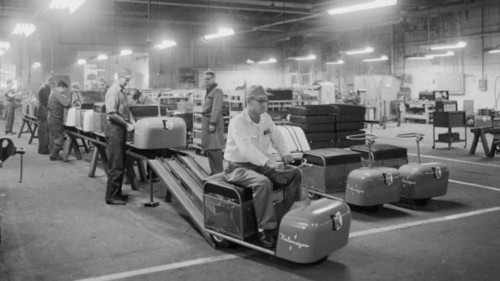Sep 13 2012
L.A.M.E. strikes again, in an office environment
See on Scoop.it – lean manufacturing
L.A.M.E. (Lean As Mistakenly Executed) is giving Lean a bad name. The article’s lead paragraph says is all:
“The lean manufacturing model, when applied to knowledge work, is a race to the bottom where humans are reduced to robots and creative output to widgets. The work is process-mapped to death, and management demands “faster, better, cheaper.” The concern is not for the experience of the end customer or the growth of the company, but rather ‘what can the customer live without so that we can save more money?’”
How do you respond to this? Following is a comment I posted:
What I find striking in your story is that you never mention what your office was supposed to be doing, which suggests to me that the “Lean” approach was the deployment of generic tools under the mistaken assumption that they would help regardless of whether the office was architecting skyscrapers or processing insurance claims.
First, you have Toyota, the company where Lean was invented as a means of becoming a better car maker. It worked. Then you have had many people who used Toyota’s reputation to peddle simplistic, dumbed-down copies of Toyota’s system under the Lean label. It didn’t work, and they are giving Lean a bad name.
Then you have had more people further simplify and double-dumb down the approach to port it over to offices, and it seems to be what you experienced.The starting point should be the work: what it is, how much of it there is, and how it varies over time. Then you look for ways to improve effectiveness, which means producing more relevant, higher-quality output faster. Finally, you worry about efficiency, which means eliminating waste in the process. And waste is by definition stuff you are better off not doing, like printing and disributing reports nobody reads.
My recommendation to you is to go back and study the original, rather than the output of a multi-stage telephone game.
See on lukerumley.com

September 13, 2012 @ 1:25 pm
I found that post striking as I have been meaning to read Linchpin because it looks like a book that should be very well aligned with lean principles.
My organization had one of those unfortunate “houses” that are supposed to somehow explain our lean approach. It does a poor job as I think all of them do. One of the few things I liked about the house that I haven’t seen anywhere else was a person holding up the peak of the roof. To go with this we used the phrase and continuously re-iterated the term: “People Linchpin the System”. In other words, the whole mechanism is useless if you are not engaging people in creative problem solving.
I have always felt that the fundamental principle of “lean” is to create systems that not only encourage but force creativity. For instance: The purpose of a kanban in lean is to encourage problem solving (an inherently creative activity), where as in L.A.M.E it always seems to be purpoted to have the purpose of controlling inventory (an activity counter to creativity).
It kind of made me laugh that he said he wanted to be a “linchpin…Not a cog in a machine.” A linchpin is precisely a cog in a machine.
Does anybody else cringe whenever they see the term “knowledge” worker? Two things pop into my head whenever I hear this term:
1) If they are “knowledge” workers what are the rest of the world and what does that imply about societies perspective on manufacturing specifically?
2) Disconnected. Unfortunately, I have a stereotype in my head of the “knowledge worker” that is the opposite of knowledgable. What I envision when I think knowledge worker is the opposite of a linchpin. I see offices of people that don’t really understand how their jobs are connected to society. In manufacturing I know that I make a product that people are going to use to solve a problem they have in life.
September 13, 2012 @ 1:36 pm
Thanks for flagging this post, Michel. I’ve also commented there.
September 13, 2012 @ 1:37 pm
And here was my criticism, by the way, of Godin’s misunderstanding of “factory thinking.”
http://www.leanblog.org/2010/10/seth-godin-catches-all-manufacturers-unfairly-in-his-factory-thinking-net/
(thanks for linking to my “L.A.M.E.” post)